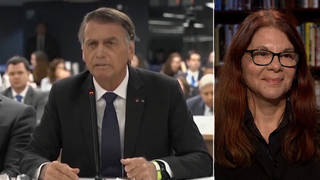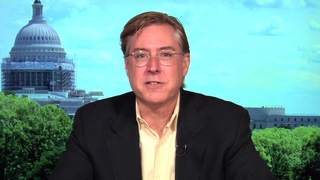
Guests
- Bill Curryweekly political columnist at Salon.com. Curry was a White House counselor to President Clinton and a two-time Democratic nominee for governor of Connecticut. He is now working on a book on President Obama and the politics of populism.
- Phyllis Bennisfellow at the Institute for Policy Studies and author of several books, including, most recently, Understanding ISIS and the New Global War on Terror.
Although finding concord on a host of issues including foreign policy, Saturday’s Democratic presidential debate highlighted a key difference between front-runner Hillary Clinton and top challenger Bernie Sanders: the economy. Clinton said corporations would welcome her in the White House, while Sanders pointedly said they wouldn’t. “The CEOs of large multinationals may like Hillary. They ain’t going to like me,” Sanders said. “And Wall Street is going to like me even less. And the reason for that is we’ve got to deal with the elephant in the room, which is the greed, recklessness and illegal behavior on Wall Street.” We get reaction to Clinton and Sanders’ comments from two guests: Bill Curry, political columnist at Salon.com and former White House counselor to President Clinton, and Phyllis Bennis, author and fellow at the Institute for Policy Studies.
Transcript
AMY GOODMAN: We turn to another clip from Saturday evening’s Democratic presidential debate. ABC moderator David Muir asked Hillary Clinton if she’s a friend of corporate America.
DAVID MUIR: Secretary Clinton, I did want to ask you, the last time you ran for president, Fortune magazine put you on its cover with the headline “Business Loves Hillary,” pointing out your support for many CEOs in corporate America. I’m curious—eight years later, should corporate America love Hillary Clinton?
HILLARY CLINTON: Everybody should. Look, I have said I want to be the president for the struggling, the striving and the successful. I want to make sure the wealthy pay their fair share, which they have not been doing. I want the Buffett Rule to be in effect, where millionaires have to pay 30 percent tax rates, instead of 10 percent to nothing, in some cases. I want to make sure we rein in the excessive use of political power to feather the nest and support the super wealthy. But I also want to create jobs. And I want to be a partner with the private sector. I’m particularly keen on creating jobs in small business.
DAVID MUIR: Senator Sanders, I want to stay on this and ask you: How big a role does corporate America play in a healthy economy, and will corporate America love a President Sanders?
SEN. BERNIE SANDERS: No, I think they won’t. So Hillary and I have a difference. The CEOs of large multinationals may like Hillary. They ain’t going to like me, and Wall Street is going to like me even less. And the reason for that is we’ve got to deal with the elephant in the room, which is the greed, recklessness and illegal behavior on Wall Street. When you have six financial institutions in this country that issue two-thirds of the credit cards and one-third of the mortgages, when three out of four of them are larger today than when we bailed them out because they are too big to fail, we have got to re-establish Glass-Steagall. We have got to break the large financial institutions up. So I don’t think—having said that, I don’t think I’m going to get a whole lot of campaign contributions from Wall Street. I don’t have a super PAC. I don’t want campaign contributions from corporate America.
And let me be clear: While there are some great corporations creating jobs and trying to do the right thing, in my view—and I say this very seriously—the greed of the billionaire class, the greed of Wall Street is destroying this economy and is destroying the lives of millions of Americans. We need an economy that works for the middle class, not just a handful of billionaires. And I will fight and lead to make that happen.
AMY GOODMAN: That’s Bernie Sanders and Hillary Clinton in the debate that also included the former governor of Maryland, Martin O’Malley, on Saturday night, the presidential debate that took place in Manchester, New Hampshire.
Bill Curry is our guest, weekly political columnist at Salon.com. His most recent article is headlined “Debbie Wasserman Schultz must go, and the case Bernie Sanders must make tonight,” which he wrote ahead of Saturday’s debate. Curry was a White House counselor to President Clinton, two-time Democratic nominee for governor of Connecticut. We are also joined by Phyllis Bennis, a fellow with the Institute for Policy Studies.
Bill, I wanted to go to you first on this response.
BILL CURRY: Well, I think that, again, there’s a lot more that I think that Bernie Sanders has to do in order to make this case. And his tendency in all of this has been, he’s—one, he’s rightly proud of never having run a negative ad. He doesn’t want to do negative politics. He thinks it’s hurt the country. I agree. Second, he doesn’t want to go down as the guy who softened Hillary up for the kill, who only did her damage. And at the same time, I just think that he takes the whole thing too far. Clarifying hard choices is exactly why we have debates and why we have elections. And I think that there is—
AMY GOODMAN: Well, he was clarifying a difference right there, wasn’t he?
BILL CURRY: And he was. I think he also has to, though, go a little bit further. You know, this is—this is a system in which the pay-to-play politics, of which Clinton is an architect—again, sharpening the differences with his opponent, in order to sharpen the differences over policy. Hillary is literally not just a poster child. She, Rahm Emanuel, their campaign, the later Obama campaign, these were the first Democratic campaigns since Andrew Jackson to raise more money from business than Republicans. The bond they made with Wall Street has been critical in how they’ve built their party. And it’s why the middle class is dying. This symbiotic relationship between ever more concentrated and powerful global capital and pay-to-play politics is at the heart of what’s gone wrong here. At one point in the previous debate, Clinton said that—pardon me—that Sanders was impugning her integrity by raising the issue of moneyed interests. And it was a point for him, I think, to turn to her and say, “I’m not impugning your integrity. I’m impugning the integrity of the system. And I’m telling you that the kind of political system we have right now is the reason the middle class is dying in this country. And the reason that I should be president instead of you is that you don’t know it, and that you’ve helped build that system, and that you still defend it.”
And secondly, there are moments, such as in healthcare and in the banking issue, where you have to go further than just say “break them up.” You have to make sure people know that for all the rhetoric that Clinton herself engages in a great deal about the opportunity of capitalism to build families and build small businesses, these big banks don’t lend money to small businesses anymore. This is a fight right now not just between left and right, but between honest and dishonest, and between small and big. We’ve become a nation of middlemen and toll collectors, of parasites, who the government allows to set up the ability to take fees. Every time you swipe a credit card, one of the major banks takes 1.75 percent of the transaction. They don’t have to lend money to small businesses and to homeowners anymore. The vital organs of this economy are shutting down because of the way our democracy is mortgaged to the wealthy and the powerful. By being mortgaged to them, it’s mortgaged to the past. And if someone gets up and says that strongly enough and clearly enough, this could become a more vibrant election. I’m amazed at the progress Sanders has made, and I’m amazed at its—at the appeal of its message, despite the fact that he’s been shut down by the corporate media so much.
AMY GOODMAN: Well, Bill, before—
BILL CURRY: But there are ways in which I think we could push this further.












Media Options